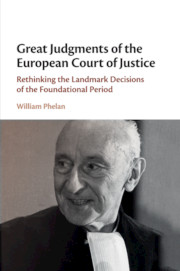 Great Judgments of the European Court of Justice
Great Judgments of the European Court of Justice Protection of Fundamental Rights
Published online by Cambridge University Press: 04 November 2020
This chapter discusses the Court’s 1970 judgment, Internationale Handelsgesellschaft, where the Court declared that the Court of Justice itself would take on the role of reviewing whether European legal obligations were in conflict with the fundamental rights of individuals. This judgment is often understood as derived from the sensitive relationship between the Court of Justice and national constitutional courts that wished to protect the fundamental rights set out in their national constitutions. This chapter demonstrates, however, that in Germany and Italy the national constitutional courts had already developed an accommodating approach to potential conflicts between treaty obligations and national constitutional law fundamental rights, and therefore that the possibility of clashes between European law and national constitutional law fundamental rights in the early years of European legal integration was less of a practical challenge than is often understood.
To save this book to your Kindle, first ensure no-reply@cambridge.org is added to your Approved Personal Document E-mail List under your Personal Document Settings on the Manage Your Content and Devices page of your Amazon account. Then enter the ‘name’ part of your Kindle email address below. Find out more about saving to your Kindle.
Note you can select to save to either the @free.kindle.com or @kindle.com variations. ‘@free.kindle.com’ emails are free but can only be saved to your device when it is connected to wi-fi. ‘@kindle.com’ emails can be delivered even when you are not connected to wi-fi, but note that service fees apply.
Find out more about the Kindle Personal Document Service.
To save content items to your account, please confirm that you agree to abide by our usage policies. If this is the first time you use this feature, you will be asked to authorise Cambridge Core to connect with your account. Find out more about saving content to Dropbox.
To save content items to your account, please confirm that you agree to abide by our usage policies. If this is the first time you use this feature, you will be asked to authorise Cambridge Core to connect with your account. Find out more about saving content to Google Drive.